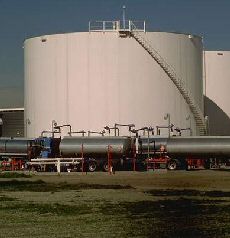7 August 2006
Biofuels Under The Spotlight
by Kate Melville
 At this year's Annual Meeting of the American Society of Plant Biologists, long-standing renewable energy advocate Professor Chris Somerville, Carnegie Institution and Stanford University, urged greater coordination among biofuel researchers. Somerville is encouraged by recent initiatives into biofuels, but suggests that a pooling of plant biology knowledge may be needed before a transition from fossil to biofuels could be made viable.
At this year's Annual Meeting of the American Society of Plant Biologists, long-standing renewable energy advocate Professor Chris Somerville, Carnegie Institution and Stanford University, urged greater coordination among biofuel researchers. Somerville is encouraged by recent initiatives into biofuels, but suggests that a pooling of plant biology knowledge may be needed before a transition from fossil to biofuels could be made viable.
During his talk, entitled "Bioenergy: The 21st Century Challenge to Plant Biologists," Professor Somerville highlighted advances and a growing interest in plant science research aimed at achieving renewable energy sources. But he also stressed that while the consequences of increased CO2 emissions have been known for some time, progress towards a solution has been disproportionately sluggish.
"In 1895, Arrhenius presented a paper to the Stockholm Physical Society titled, 'On the Influence of Carbonic Acid in the Air upon the Temperature of the Ground,' in which he argued that increased concentration of atmospheric CO2, such as that caused by combustion of fossil fuel, would lead to the warming of the earth," said Somerville. "It is apparent that [Arrhenius] was correct and that we must develop alternative sources of energy."
Somerville stated that there is no need to rely on CO2 emitting fossil fuels, as the Earth already receives about 4,000 times the amount of energy from the sun today that humans are predicted to need by 2050. As we have all learnt in school at one time or another, plants absorb the sun's energy and convert it to bio-chemical energy during photosynthesis. Due to the large quantity of renewable plant cellulose (biomass) available around the globe there is a renewed interest in using plants as a source of renewable energy. "However, because of competing uses for land, a central challenge for 21st century biologists is to increase the efficiency of solar energy capture to the theoretical limit by rational methods," said Somerville.
Somerville believes that the answer lies in the goal of greater cooperation among researchers, which would not only reduce costs, but would likely swell current levels of production of biofuels from biomass. "In order to accomplish this we need to acquire and integrate all aspects of knowledge about plant biology into a systems level understanding that can support an engineering approach to plant improvement," explained Somerville.
Somerville considers the U.S. government's latest Advanced Energy Initiative (AEI) a positive step toward achieving these goals, which he believes will help transition the nation's transportation sector to the use of domestically produced biofuels, and break the nation's addiction to oil. "Displacing use of gasoline with biofuels, such as cellulosic ethanol, will dramatically reduce emissions of stored carbon dioxide into the atmosphere," remarked Somerville.
Source: American Society of Plant Biologists
